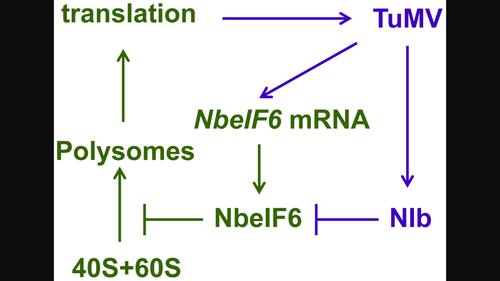当前位置:
X-MOL 学术
›
Mol. Plant Pathol.
›
论文详情
Our official English website, www.x-mol.net, welcomes your feedback! (Note: you will need to create a separate account there.)
Turnip mosaic virus NIb weakens the function of eukaryotic translation initiation factor 6 facilitating viral infection in Nicotiana benthamiana
Molecular Plant Pathology ( IF 4.9 ) Pub Date : 2024-02-22 , DOI: 10.1111/mpp.13434 Ziqiang Chen 1, 2, 3, 4 , Feng Wang 3 , Binghua Chen 2, 4 , Guanwei Wu 2, 4 , Dagang Tian 3 , Quan Yuan 2, 4 , Shiyou Qiu 2, 4 , Yushan Zhai 2, 4 , Jianping Chen 1, 2, 4 , Hongying Zheng 2, 4 , Fei Yan 2, 4
Molecular Plant Pathology ( IF 4.9 ) Pub Date : 2024-02-22 , DOI: 10.1111/mpp.13434 Ziqiang Chen 1, 2, 3, 4 , Feng Wang 3 , Binghua Chen 2, 4 , Guanwei Wu 2, 4 , Dagang Tian 3 , Quan Yuan 2, 4 , Shiyou Qiu 2, 4 , Yushan Zhai 2, 4 , Jianping Chen 1, 2, 4 , Hongying Zheng 2, 4 , Fei Yan 2, 4
Affiliation

|
Viruses rely completely on host translational machinery to produce the proteins encoded by their genes. Controlling translation initiation is important for gaining translational advantage in conflicts between the host and virus. The eukaryotic translation initiation factor 4E (eIF4E) has been reported to be hijacked by potyviruses for virus multiplication. The role of translation regulation in defence and anti-defence between plants and viruses is not well understood. We report that the transcript level of eIF6 was markedly increased in turnip mosaic virus (TuMV)-infected Nicotiana benthamiana. TuMV infection was impaired by overexpression of N. benthamiana eIF6 (NbeIF6) either transiently expressed in leaves or stably expressed in transgenic plants. Polysome profile assays showed that overexpression of NbeIF6 caused the accumulation of 40S and 60S ribosomal subunits, the reduction of polysomes, and also compromised TuMV UTR-mediated translation, indicating a defence role for upregulated NbeIF6 during TuMV infection. However, the polysome profile in TuMV-infected leaves was not identical to that in leaves overexpressing NbeIF6. Further analysis showed that TuMV NIb protein, the RNA-dependent RNA polymerase, interacted with NbeIF6 and interfered with its effect on the ribosomal subunits, suggesting that NIb might have a counterdefence role. The results propose a possible regulatory mechanism at the translation level during plant–virus interaction.
中文翻译:

芜菁花叶病毒NIb削弱真核翻译起始因子6的功能,促进烟草病毒感染
病毒完全依赖宿主翻译机制来产生由其基因编码的蛋白质。控制翻译起始对于在宿主和病毒之间的冲突中获得翻译优势很重要。据报道,真核翻译起始因子 4E (eIF4E) 被马铃薯病毒劫持以进行病毒增殖。翻译调控在植物和病毒之间的防御和反防御中的作用尚不清楚。我们报告说,在感染萝卜花叶病毒(TuMV)的烟草中, eIF6的转录水平显着增加。TuMV 感染因本塞姆氏烟草 eIF6 ( NbeIF6 )的过度表达而受损,要么在叶子中瞬时表达,要么在转基因植物中稳定表达。多核糖体谱分析表明,NbeIF6的过度表达导致 40S 和 60S 核糖体亚基的积累、多核糖体的减少,并且还损害 TuMV UTR 介导的翻译,表明上调的 NbeIF6 在 TuMV 感染期间具有防御作用。然而,TuMV 感染叶片中的多核糖体谱与过表达 NbeIF6 的叶片中的多聚体谱不同。进一步分析表明,TuMV NIb 蛋白(RNA 依赖性 RNA 聚合酶)与 NbeIF6 相互作用并干扰其对核糖体亚基的作用,表明 NIb 可能具有反防御作用。结果提出了植物与病毒相互作用过程中翻译水平上可能的调节机制。
更新日期:2024-02-24
中文翻译:

芜菁花叶病毒NIb削弱真核翻译起始因子6的功能,促进烟草病毒感染
病毒完全依赖宿主翻译机制来产生由其基因编码的蛋白质。控制翻译起始对于在宿主和病毒之间的冲突中获得翻译优势很重要。据报道,真核翻译起始因子 4E (eIF4E) 被马铃薯病毒劫持以进行病毒增殖。翻译调控在植物和病毒之间的防御和反防御中的作用尚不清楚。我们报告说,在感染萝卜花叶病毒(TuMV)的烟草中, eIF6的转录水平显着增加。TuMV 感染因本塞姆氏烟草 eIF6 ( NbeIF6 )的过度表达而受损,要么在叶子中瞬时表达,要么在转基因植物中稳定表达。多核糖体谱分析表明,NbeIF6的过度表达导致 40S 和 60S 核糖体亚基的积累、多核糖体的减少,并且还损害 TuMV UTR 介导的翻译,表明上调的 NbeIF6 在 TuMV 感染期间具有防御作用。然而,TuMV 感染叶片中的多核糖体谱与过表达 NbeIF6 的叶片中的多聚体谱不同。进一步分析表明,TuMV NIb 蛋白(RNA 依赖性 RNA 聚合酶)与 NbeIF6 相互作用并干扰其对核糖体亚基的作用,表明 NIb 可能具有反防御作用。结果提出了植物与病毒相互作用过程中翻译水平上可能的调节机制。



























 京公网安备 11010802027423号
京公网安备 11010802027423号